高中英语 Book 5 Unit 1学案 新人教版必修5
高中英语 Book5 Unit5 First aid Using language学案新人教版必修5
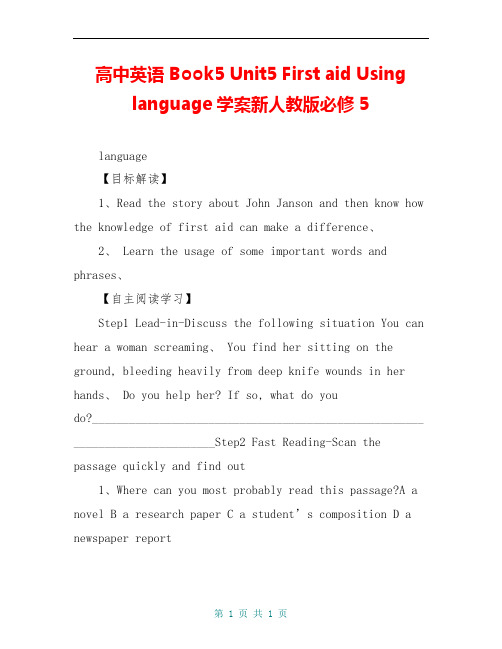
高中英语 Book5 Unit5 First aid Using language学案新人教版必修5language【目标解读】1、Read the story about John Janson and then know how the knowledge of first aid can make a difference、2、 Learn the usage of some important words and phrases、【自主阅读学习】Step1 Lead-in-Discuss the following situation You can hear a woman screaming、 You find her sitting on the ground, bleeding heavily from deep knife wounds in her hands、 Do you help her? If so, what do youdo?______________________________________________________ _______________________Step2 Fast Reading-Scan the passage quickly and find out1、Where can you most probably read this passage?A a novel B a research paper C a student’s composition D a newspaper report2、 Read the headline and the head, then answer the following questions、1)Who is the heroic teenager?________________________________________________2) What is theaward?___________________________________________________ _______3)Where and when was he awarded?_____________________________________________4) Why does he receive the award?_____________________________________________3、 The main idea of the passage: The story is about _____________ who sets us a good example because he could _________________ using his knowledge of______________Step3 Careful Reading---Read the passage carefully to get more detailed information、1、What was John doing when he heard thescreaming?_________________________________2、 What happened toAnn?_____________________________________________________ ______________________3、 What first aid did John perform onAnne?____________________________________________________ _______________________4、What saved Ms Slade’slife?____________________________________________________ _5、 Where did John learn the knowledge of firstaid?____________________ ________________6、 Put these events in the order: ______ The attacker ran away、 ______ Anne was attacked and started to scream、 ______ John performed first aid on Anne、______ John was studying in his house、 ______ The ambulance arrived、 _____ John ran outside with his father、 ____ John found Anne in her garden with terrible knife wounds、 Step4 Summary---Fill in the blanks、Last night, John heard1_________ and2_______ outside、 His neighbor Anne3_________(stab)、 She was4_______ heavily、John and his father asked for5_________, but nobodycould6_________________(找到) them、 They got sometea7_______ and8_______ from their house、 John used these to9______ the most severe injuries and10 ______ the bleeding by11_______ pressure12_____ the wounds、 It wasJohn’s13______ action and14______ of first aid15_______ saved Ann’s life、Step6 Important Phrases1 被授予荣誉____________________2 在颁奖大会__________3 对某人实施急救_________________4 被授予 ______________________5 骇人听闻的持刀杀人_________________________6 找到______________7 手上的伤口 _____________________8 按住伤口_____________________9 毫无疑问________________________10 产生差别________________________Step7 Important Sentences1 John was presented with his award at a ceremony which recognized the bravery of ten people who had saved the life of another、2 John was studying in his room when he heard screaming、3 It was John’s quick action and knowledge of first aid that saved Ms Slade’s life、4 There is no doubt that John’s quick thinking and thefirst aid skills he learned at school saved Ms Slade’s life、5 It shows that a knowledge of first aid can make a real difference、【自主学习语言点】一 Seventeen-year-old teenager, John Janson, was honoured at the Lifesaver Award last night in Tivertown…17岁青年约翰詹森昨晚在里弗镇的救生员颁奖大会上领奖…… honour vt、给予荣誉;尊敬 n、荣誉,名誉,面子;敬意;光荣的人或事[典例]1、We all honour courageous people、我们都尊重勇敢的人。
人教版英语必修五 Unit 1 全单元教案
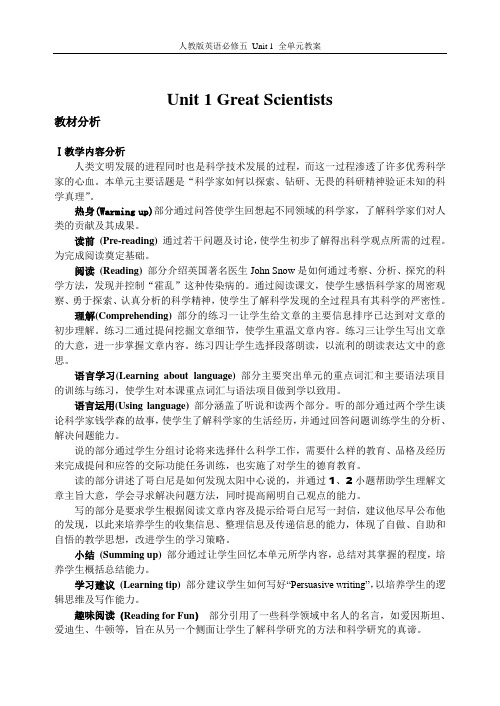
Unit 1 Great Scientists教材分析Ⅰ教学内容分析人类文明发展的进程同时也是科学技术发展的过程,而这一过程渗透了许多优秀科学家的心血。
本单元主要话题是“科学家如何以探索、钻研、无畏的科研精神验证未知的科学真理”。
热身(Warming up)部分通过问答使学生回想起不同领域的科学家,了解科学家们对人类的贡献及其成果。
读前(Pre-reading) 通过若干问题及讨论,使学生初步了解得出科学观点所需的过程。
为完成阅读奠定基础。
阅读(Reading) 部分介绍英国著名医生John Snow是如何通过考察、分析、探究的科学方法,发现并控制“霍乱”这种传染病的。
通过阅读课文,使学生感悟科学家的周密观察、勇于探索、认真分析的科学精神,使学生了解科学发现的全过程具有其科学的严密性。
理解(Comprehending) 部分的练习一让学生给文章的主要信息排序已达到对文章的初步理解。
练习二通过提问挖掘文章细节,使学生重温文章内容。
练习三让学生写出文章的大意,进一步掌握文章内容。
练习四让学生选择段落朗读,以流利的朗读表达文中的意思。
语言学习(Learning about language) 部分主要突出单元的重点词汇和主要语法项目的训练与练习,使学生对本课重点词汇与语法项目做到学以致用。
语言运用(Using language) 部分涵盖了听说和读两个部分。
听的部分通过两个学生谈论科学家钱学森的故事,使学生了解科学家的生活经历,并通过回答问题训练学生的分析、解决问题能力。
说的部分通过学生分组讨论将来选择什么科学工作,需要什么样的教育、品格及经历来完成提问和应答的交际功能任务训练,也实施了对学生的德育教育。
读的部分讲述了哥白尼是如何发现太阳中心说的,并通过1、2小题帮助学生理解文章主旨大意,学会寻求解决问题方法,同时提高阐明自己观点的能力。
写的部分是要求学生根据阅读文章内容及提示给哥白尼写一封信,建议他尽早公布他的发现,以此来培养学生的收集信息、整理信息及传递信息的能力,体现了自做、自助和自悟的教学思想,改进学生的学习策略。
人教版高中英语必修5Unit1-Unit5全册全套教案教学设计
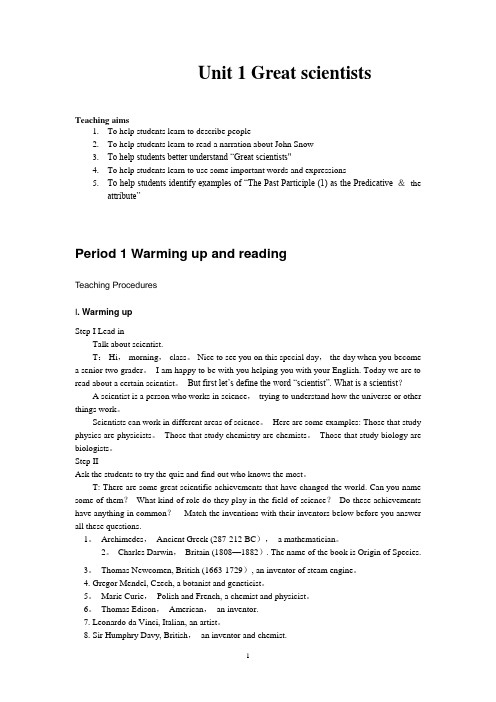
Unit 1 Great scientistsTeaching aims1.To help students learn to describe people2.To help students learn to read a narration about John Snow3.To help students better understand “Great scientists"4.To help students learn to use some important words and expressions5.To help students identify examples of “The Past Participle (1) as the Predicative &theattribute”Period 1 Warming up and readingTeaching ProceduresI. Warming upStep I Lead inTalk about scientist.T:Hi,morning,class。
Nice to see you on this special day,the day when you become a senior two grader。
I am happy to be with you helping you with your English. Today we are to read about a certain scientist。
But first let’s define the word “scientist”. What is a scientist?A scientist is a person who works in science,trying to understand how the universe or other things work。
人教高中英语必修五:Unit+1教案-1.doc
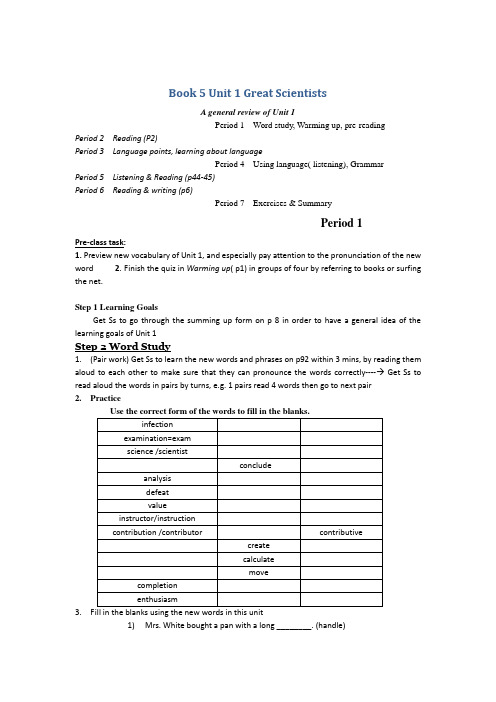
Book 5 Unit 1 Great ScientistsA general review of Unit 1Period 1 Word study, Warming up, pre-readingPeriod 2 Reading (P2)Period 3 Language points, learning about languagePeriod 4 Using language( listening), GrammarPeriod 5 Listening & Reading (p44-45)Period 6 Reading & writing (p6)Period 7 Exercises & SummaryPeriod 1Pre-class task:1. Preview new vocabulary of Unit 1, and especially pay attention to the pronunciation of the new word2. Finish the quiz in Warming up( p1) in groups of four by referring to books or surfing the net.Step 1 Learning GoalsGet Ss to go through the summing up form on p 8 in order to have a general idea of the learning goals of Unit 1Step 2 Word Study1. (Pair work) Get Ss to learn the new words and phrases on p92 within 3 mins, by reading them aloud to each other to make sure that they can pronounce the words correctly---- Get Ss to read aloud the words in pairs by turns, e.g. 1 pairs read 4 words then go to next pair2. Practice3.1)Mrs. White bought a pan with a long ________. (handle)2)The pollution is so ________ that we have to take some measures to stop it.(severe)3)He has a big nose that is a ________ of his family. (characteristic)4)Water and salt are ________ into our blood stream every day. (absorbed)5)If a doctor or a medical treatment ________ someone’s illness, they make theperson well again. (cure)6) A ________ is a kind of germ that can cause disease. (virus)Step 3. Warming up(Group competition) Check the answers to the quiz to find out which group know the most . Show pictures to introduce some scientists while Ss giving the correct answers-- congratulations to the winning groupStep 4 Pre-reading1. (Pair work) What five most important qualities do you think a scientist should have? Give reasons.clever/talented strict patient creative determined/strong-willed positivehonest energetic intelligent/hard-working ambitious careful co-operativeconfident brave2. (Group work) Ex2, p1Do you know how to prove a new idea in scientific research? Discuss in groups the stages in examining a new scientific idea. What order would you put them in?Draw a conclusion Think of a method Collect results Make up a question Find a problem Analyse the results Repeat if necessaryStep 5. Summary1.Seeing much, suffering much, and studying much are three pillars (支柱,要素) of learning.2.learning without thought is a labour lost; thought without learning is perilous(危险的)3. To know the disease is half the cure. 找出病根等于医治了一半。
高中英语《必修五第一单元单元词汇课》优质课教案、教学设计

教案设计(Learning about Language)部分由“词汇学习”和“语法学习”两项内容组成。
“词汇学习” 部分练习1 通过词的后缀训练名词与形容词之间的相互转换提倡学生使用词典。
练习2 选词填空练习,利用语篇集中训练本单元的一些重点词汇的用法。
练习3 是单句填空,而且所选的十个句子或是引文或是谚语。
“语法学习”部分主要是帮助学生了解、熟悉并掌握情态动词的用法,共有三项练习。
“语言运用”(Using Language)部分主要是让学生运用本单元所学的语言知识与课文内容进行听、说、读、写等的综合训练。
“听与说” (Listening and speaking); 是听前准备活动。
“读与写”(Reading and writing)主要设计是:阅读内容主要讲述一位来自高中的学生对全球变暖十分关注并向地球保护协会写了一封信询问措施。
协会给出了相当令人满意的回信。
短文后的三个问题帮助学生理解文章的内容。
写信的部分主要是要求学生根据上面阅读文章的内容通过思考写出自己的思想、自己的做法,尝试解决问题的不同途径。
教材提供给学生一些写作时要思考的问题,帮助学生完成写作构思。
“小结”(S ummin g U p)部分让学生根据所给出的提示对所学各项内容进行总结。
“学习建议”(L e a r nin g T ip)部分主要建议学生看阅读报纸,多读书多总结,以培养学生运用语言资源的能力。
五、教学重点Teaching important pointsa.The usage of language points of this unit.b.To learn to use these words.教学难点Teaching difficult pointsa.Enable students to get the hang of the language points completely.b.Get students to discuss warmly and express their own and excellent idea.教学方法Teaching methodsa.Brainstormingb.Task based language teaching.c.Individual, pair or group work to finish each task.d.Discussion.教学过程:1.concludevi.推断出vt.结束①conclude 推断出;断定conclude...with... 以...结束conclusion n .结论;结束arrive at/come to/reach/draw a conclusion 得出结论in conclusion 总而言之学生去说;学生能做的教师就不要代替学生去做;学生回答问题无论对还是错,教师不要急于评判,让学生自已去评判与总结;对发言积极的学生要及时鼓励,决不能因为他们的答案与教师的标准答案不一样就否定并伤害学生的自尊心。
最新人教版高中英语必修五导学案全册精品
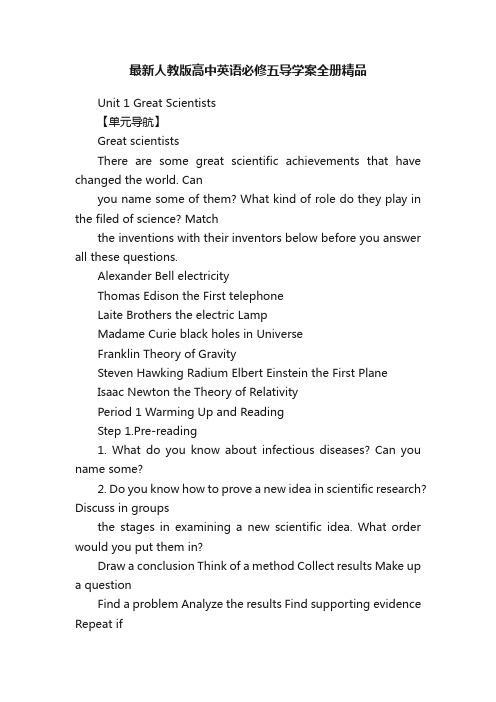
最新人教版高中英语必修五导学案全册精品Unit 1 Great Scientists【单元导航】Great scientistsThere are some great scientific achievements that have changed the world. Canyou name some of them? What kind of role do they play in the filed of science? Matchthe inventions with their inventors below before you answer all these questions.Alexander Bell electricityThomas Edison the First telephoneLaite Brothers the electric LampMadame Curie black holes in UniverseFranklin Theory of GravitySteven Hawking Radium Elbert Einstein the First PlaneIsaac Newton the Theory of RelativityPeriod 1 Warming Up and ReadingStep 1.Pre-reading1. What do you know about infectious diseases? Can you name some?2. Do you know how to prove a new idea in scientific research? Discuss in groupsthe stages in examining a new scientific idea. What order would you put them in?Draw a conclusion Think of a method Collect results Make up a questionFind a problem Analyze the results Find supporting evidence Repeat ifnecessaryStep2. Fast-reading(方法导引:略读或浏览阅读skimming:忽略不懂的句子和生词,快速阅读原文。
Book5 Unit 1复习导学案
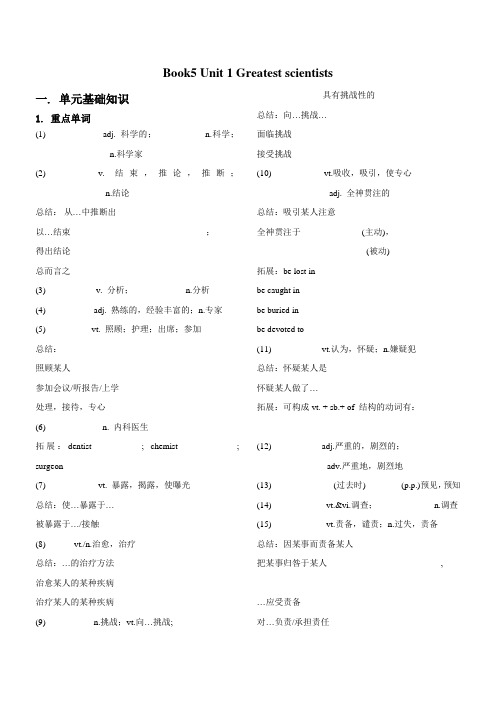
Book5 Unit 1 Greatest scientists一. 单元基础知识1. 重点单词(1) ____________adj. 科学的;__________ n.科学;______________n.科学家(2)____________v. 结束,推论,推断;______________n.结论总结:从…中推断出____________________以…结束______________________________;得出结论___________________________________总而言之__________________(3)___________ v. 分析;____________n.分析(4) __________ adj. 熟练的,经验丰富的;n.专家(5)__________ vt. 照顾;护理;出席;参加总结:照顾某人______________参加会议/听报告/上学___________________________ 处理,接待,专心____________________(6) ____________ n. 内科医生拓展:dentist __________; chemist ____________; surgeon____________(7) ___________ vt. 暴露,揭露,使曝光总结:使…暴露于…_________________被暴露于…/接触____________________(8) ______vt./n.治愈,治疗总结:…的治疗方法________________治愈某人的某种疾病____________________治疗某人的某种疾病____________________(9) __________ n.挑战;vt.向…挑战;____________具有挑战性的总结:向…挑战…_________________________面临挑战_________________________________接受挑战____________________________(10) ___________ vt.吸收,吸引,使专心-____________ adj. 全神贯注的总结:吸引某人注意___________________全神贯注于______________(主动),________________(被动)拓展:be lost in ______________________be caught in ____________________be buried in _____________________be devoted to ___________________(11) ___________vt.认为,怀疑;n.嫌疑犯总结:怀疑某人是_______________________怀疑某人做了…________________________拓展:可构成vt. + sb.+ of 结构的动词有:______________________________________________ (12) ___________adj.严重的,剧烈的;_____________adv.严重地,剧烈地(13) ______ - ______(过去时)- _______(p.p.)预见,预知(14) ____________vt.&vi.调查;_____________n.调查(15) ____________vt.责备,谴责;n.过失,责备总结:因某事而责备某人_______________________ 把某事归咎于某人__________________________,_______________________________…应受责备___________________对…负责/承担责任_________________________(16) _________vt.污染,弄脏;__________n.污染;___________adj. 受污染了的(17) ____________n.把手,柄;vt.___________(18) ___________vt.宣布,通告;___________n.宣布,通告;_________n.播音员总结:It is announced that __________make an announcement ____________(19)________vt.命令,指示,教导;_______________n.指示,用法说明(复)总结:指示/命令某人做某事_____________________; 指示/命令某人不能做某事_______________________; 某人被命令做某事___________________________;某人被命令不能做某事_________________________ instruct that sb.________________(do) sth.(20)___________adj.有责任的,负责的;_____________n.责任,职责总结:为…负责_______________________(21) ______vt.建设,修建;__________n.建设,建筑物总结:在建设中________________________(22)__________vt.&vi.捐献,贡献;投稿____________n.贡献,捐助总结:把…贡献给…_______________________ contribute to _____________________________make a contribution to______________________(23)___________adj.有创造力的;___________v.创造(24)________adj积极的,肯定的;________adj.消极的总结:对…有积极的态度________________________ (25)___________adj.热情的;______________n.热情总结:热衷于_________________________(26)____________adj.小心的,谨慎的;_______________n.小心,谨慎总结:____________adv.=___________小心地,谨慎地; 对…谨慎的____________________________(27) ________vt. 拒绝总结:拒绝某物________________;拒绝做…________________2.重点短语(1) put forward_________________________________; 储存,不考虑____________; 推迟,延期_____________; 出版,熄灭__________;容忍,忍受_________________;张贴,举起,建造________;为…提供住宿____________________(2) 将…和…联系或连接起来(主动)________________(3) 调查_____________(4) 减速__________(5) 除…以外(注意辨析)___________________________________________ (6)对某人要求严格的______________________;对某事要求严格的______________________(7)导致,造成__________________________________(8)讲得通,有意义____________;没道理,讲不通_______________;理解,明白______________;决不________________;在某种意义上____________________做…没必要/没道理_____________________________ 3.课文短语:Page 11.know about2.lift up3.keep…safe4.put forward5.set out a new idea6.put sth in order7.find supporting evidence8.analyze the resultsPage 2-39.ordinary people10.the deadly disease11.of its day12.thousands of terrified people13.multiply in the air14.The disease spread quickly.15.be determined to do sth.16.make further investigations17.be to blame18.look into19.the river polluted by the dirty water20.slow down21.be linked to22.have sth. delivered to23.with certainty24.carry the virus/ germs25.be instructed not to do sth.Page4-526.be responsible for27.take ine to an end 29.develop a severe illness30.apart from31.make one’s way to32.make up one’s mind33.make room for34.make the bed35.make sure thatPage 736.make sense37.at times38.make changes to sth.39.publish one’s ideas40.be cautious (about)41.be against42.lie-lied-lied-lying 撒谎lie-lay-lain-lying 位于,下蛋lay-laid-laid-laying 放置43.arise-arose-arisen vi 出现/呈现rise-rose-risen vi. 升起raise-raised-raised vt. 举起,使升4.重点句型(1) ____its cause ____its cure was understood.人们既不知道它的病源,也不了解对它的治疗。
2020-2021学年英语新教材人教版必修第一册学案:UNIT 5 预习新知早知道 Word版含解
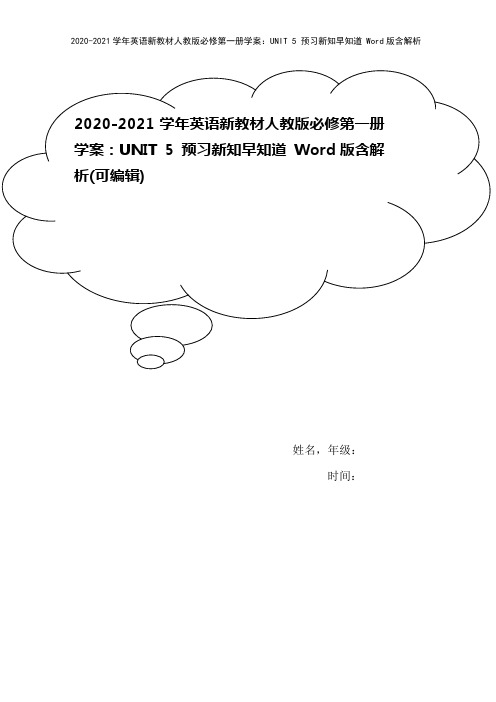
姓名,年级:时间:Ⅰ.匹配词义( )1。
factor A.n.符号;象征( )2.system B.n。
王朝;朝代()3。
bone C.n。
因素;要素()4。
calligraphy D.n.骨头;骨(质)( )5.dynasty E.n。
体系;制度;系统()6。
carve F.n.书法;书法艺术()7。
symbol G.vt。
& vi.雕刻( )8.gap H.n。
间隔;开口;差距()9.point of view I.浮沉,兴衰()10。
ups and downs J.观点,看法[答案] 1-5 CEDFB 6-10 GAHJIⅡ.默写单词1.despite prep。
即使;尽管2.attitude n.态度;看法3.major adj。
主要的;重要的;大的n.主修课程;主修学生vi。
主修;专门研究4.means n.方式;方法;途径5.character n.文字;符号;角色;品质;特点6.appreciate vt。
欣赏;重视;感激;领会vi.增值7.equal n.同等的人;相等物adj。
相同的;同样的8.regard n.尊重;关注vt.把……视为;看待9.specific adj.特定的;明确的;具体的10.struggle n.&vi.斗争;奋斗;搏击Ⅰ。
语境填空regarded,major,carved,gaps,dialects,dating,symbols,classic,related,civilisationhuge gapsthe European history.2.Chinese characters are just meaningless symbols to most of the foreigners.3.It is required that what you will write should be related to everyday life.4.Since you are interested in Chinese classic novels,I think this book is well worth reading。
高中英语 Book 5 Unit 1学案 新人教版必修5
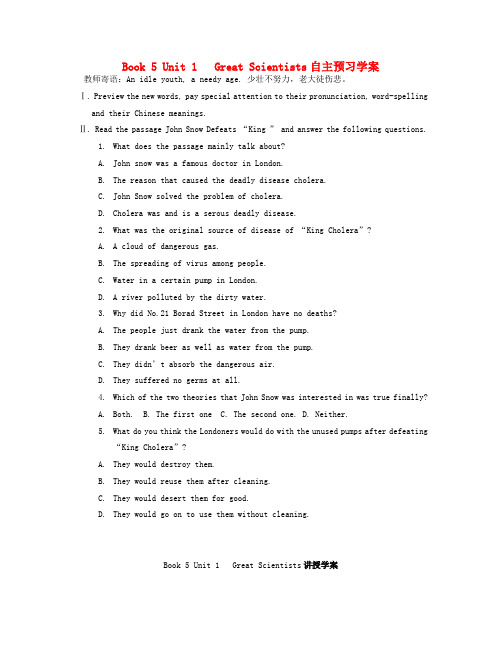
Book 5 Unit 1 Great Scientists自主预习学案教师寄语:An idle youth, a needy age. 少壮不努力,老大徒伤悲。
Ⅰ. Preview the new words, pay special attention to their pronunciation, word-spelling and their Chinese meanings.Ⅱ. Read the passage John Snow Defeats “King ” and answer the following questions.1.What does the passage mainly talk about?A.John snow was a famous doctor in London.B.The reason that caused the deadly disease cholera.C.John Snow solved the problem of cholera.D.Cholera was and is a serous deadly disease.2.What was the original source of disease of “King Cholera”?A. A cloud of dangerous gas.B.The spreading of virus among people.C.Water in a certain pump in London.D. A river polluted by the dirty water.3.Why did No.21 Borad Street in London have no deaths?A.The people just drank the water from the pump.B.They drank beer as well as water from the pump.C.They didn’t absorb the dangerous air.D.They suffered no germs at all.4.Which of the two theories that John Snow was interested in was true finally?A.Both.B. The first oneC. The second one.D. Neither.5.What do you think the Londoners would do with the unused pumps after defeating“King Cholera”?A.They would destroy them.B.They would reuse them after cleaning.C.They would desert them for good.D.They would go on to use them without cleaning.Book 5 Unit 1 Great Scientists讲授学案制作人:刘远花李晓田审核人:刘庆民制作时间:2009-8-31教师寄语: You must believe in yourself. That is the first step to success.词汇学习:Ⅰ. 重点单词1.defeate.g. (1)John beat Tom at table tennis yesterday.(2)The English team was defeated by three goals to one.(3)The government has suffered a serious defeat.(4)I wonder who has won the game.精讲点拨归纳用法:___________________________.1) They say he was ______ by lightning during a terrible thunderstorm.A. defeatedB. caughtC. damagedD. struck2) In the first two years of the war in former Yugoslavia, 28 reporters and photographers were killed. Hundreds more were ______.A. injuredB. buriedC. defeatedD. saved3) It is said that Jim ____ Tom by about a meter and ___ the race at last.2. attende.g. (1) Will you be attending the meeting tomorrow?(2) The queen had a good doctor attending (on) her.(3) Were you attending to what I was saying?精讲点拨归纳用法:_________________________.1) I wrote him a letter to show my ______ of his thoughtfulness.A. achievementB. agreementC. attentionD. appreciation2) The company is starting a new advertising campaign to _____ new customers to its stores.A. joinB. attractC. stickD. transfer3) Tim ____ to a neighborhood watch group in Stoneville, Indiana, USA.A. attendsB. belongsC. goesD. turns3. exposee.g. (1)He smiled suddenly, exposing a set of amazingly white teeth.(2)He didn’t want to expose his fear to anyone.(3)She was exposed as a liar.(4)Don’t expose babies to strong sunshine.精讲点拨归纳用法:_____________________.1) ______ to the strong sunbeam too long, his face got sunburnt.A. ExposingB. Having exposedC. ExposedD. To expose2) ______ to the strong sunbeam made his face sunburnt.A. ExposingB. Having exposedC. ExposedD. Having been exposed4. curee.g. (1)When I left hospital, I was completely cured.(2)This medicine will cure you of your cough.(3)There is no cure for this kind of illness.精讲点拨归纳用法:___________________.1) More patients _____ in hospital this year than last year.A. treatedB. have treatedC. had been treatedD. have been treated2)My grandma has been cured _____ her heart disease.A. offB. ofC. aboutD. away5. blamee.g. (1)Don’t blame me if it doesn’t work—it’s not my fault.(2)They blamed the Russians for the failure of the talks.(3)I t’s Mr. Lee who is to blame.(4)The judge laid the blame for the accident on the driver of the car.精讲点拨归纳用法:___________________.blame sb. for sth; scold sb. for sth; charge sb. with sth1)_____ for the breakdown of the school computer network, Alice was in low spirits.A. BlamingB. BlamedC. To blameD. To be blamed2)Mr. Green stood up in defense of the 16-year-old boy, saying that he was not the one _____.A. blamedB. blamingC. to blameD. to be blamed6. contributee.g. (1)I contributed a pound to John’s leaving present.(2)He regularly contuibuted to the college magazine.(3)Carelessness caused/ led to/ resulted in/ brought about the serious trafficaccident.精讲点拨归纳用法:___________________.Do you know the cause ____ his failure in the driving test?A. led toB. brought forthC. contributing toD. attributing to7.announcee.g. (1)They haven’t formally announced their engagement yet.(2)Would you announce the guest when they arrive?(3)He declared that he fell in love with her.(4)He declared nothing to pay the tax for, but I knew he was lying.精讲点拨归纳用法:___________________.用announce 或declare 的正确形式填空。
2021-2022学年高中英语人教版必修五教学案:Unit 1 Section Ⅳ Word版含答案

SectionⅣLearningaboutLanguage&UsingLanguage对应同学用书P15[原文呈现]COPERNICUS' REVOLUTIONARY①THEORYNicolaus Copernicus②was frightened and his mind was confused③. Although he had tried to ignore them, all his mathematical calculations led to④the same conclusion that the earth was not the centre of the solar system⑤. Only if you put the sun there did⑥the movements⑦of the other planets in the sky make sense⑧. Y et he could not tell anyone about his theory as the powerful Christian Church⑨would have punished him for even suggesting such an idea. They believed God had made the world and for that reason⑩the earth was special and must be the centre of the solar system.[读文清障]①revolutionary [ˌrevə'luːʃənərI]adj.革命的;重大变革的②Nicolaus Copernicus ['nIkələs kəʊ'pɜːnIkəs]尼古拉·哥白尼(波兰天文学家)③confused adj.困惑的;苦恼的④lead to通向;导致⑤the solar system太阳系⑥only后接if引导的状语从句,主句使用部分倒装。
人教新课标高二英语必修五 Unit 1 精品学案

必修五Unit 1学案课时一重点单词1conclude vt.& vi.结束;推断出conclude sth.with...就某事与某人达成协议;以……结束conclude sth.from...从……推断出……arrive at/reach/come to/draw a conclusion得出结论make a conclusion下结论to conclude= in conclusion总之;最后In conclusion,people around the world should be aware of the real situation of water shortage.总之,全世界的人都应该意识到水短缺的真正形势。
(2010·福建·书面表达)When the group discussion is nearing its end,make sure to conclude it with important points(用几条要点作为结束).2attend vt.照顾;出席;陪伴attend school/class/church/meeting 上学/上课/做礼拜/参加会议attend to sb./sth.处理;照料;专心;attend on/upon sb.伺候某人,照顾某人attendance n.出席,到场;出席人数I always have so many things to attend to when I come back to the company after a trip abroad.Thousands of people attended the ceremony.3expose v.暴露;揭露;使曝光expose...to使显露;暴露(let out , give away ) be exposed to暴露于;经受……expose sb.to...让某人接触某物;使某人暴露于……They had not been exposed to most diseases common to urban populations.城市人口中多数常见的疾病他们都没有接触到。
人教版英语必修五 Unit 1 教案
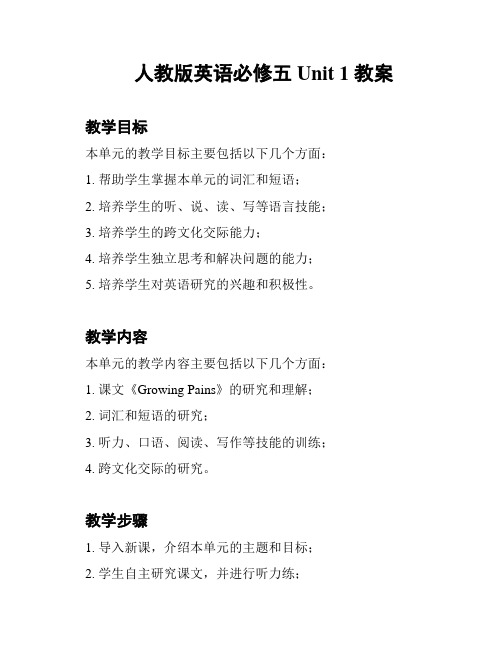
人教版英语必修五 Unit 1 教案教学目标本单元的教学目标主要包括以下几个方面:1. 帮助学生掌握本单元的词汇和短语;2. 培养学生的听、说、读、写等语言技能;3. 培养学生的跨文化交际能力;4. 培养学生独立思考和解决问题的能力;5. 培养学生对英语研究的兴趣和积极性。
教学内容本单元的教学内容主要包括以下几个方面:1. 课文《Growing Pains》的研究和理解;2. 词汇和短语的研究;3. 听力、口语、阅读、写作等技能的训练;4. 跨文化交际的研究。
教学步骤1. 导入新课,介绍本单元的主题和目标;2. 学生自主研究课文,并进行听力练;3. 进行课文的理解和讨论,引导学生思考和表达观点;4. 研究和掌握本单元的词汇和短语;5. 进行听说训练,提高学生的口语表达能力;6. 进行阅读和写作训练,培养学生的阅读理解和写作技能;7. 进行跨文化交际的研究,增进学生对英语和其他文化的认识。
教学评价本单元的教学评价主要以以下方式进行:1. 各种形式的课堂练和作业,检测学生对知识的掌握程度;2. 口语和写作表现的评价,评估学生语言运用的能力;3. 学生参与课堂讨论和发言的情况,评估学生的思维能力和表达能力。
教学资源本单元的教学资源包括以下几个方面:1. 课本《人教版英语必修五》;2. 音频材料;3. 多媒体设备;4. 教学课件和作业练册。
以上为《人教版英语必修五 Unit 1 教案》的简要内容,旨在帮助教师设计和安排本单元的教学活动。
具体的教学步骤和细节应根据实际情况进行调整和完善。
人教版高中英语必修五教案(全册)
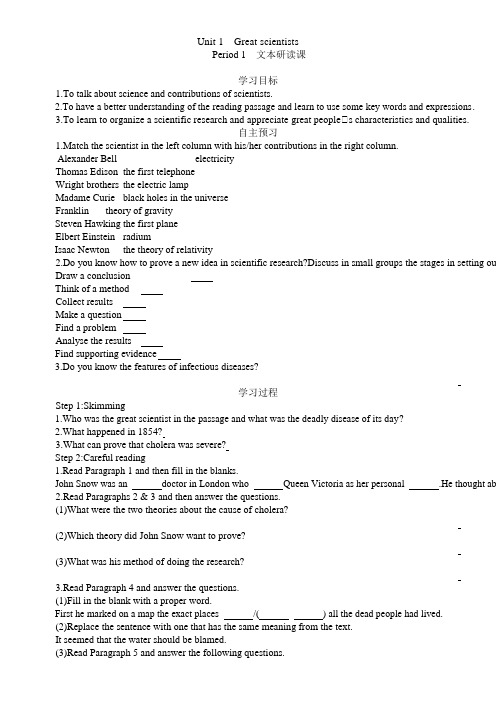
Unit 1Great scientistsPeriod 1文本研读课学习目标1.To talk about science and contributions of scientists.2.To have a better understanding of the reading passage and learn to use some key words and expressions.3.To learn to organize a scientific research and appreciate great people s characteristics and qualities.自主预习1.Match the scientist in the left column with his/her contributions in the right column.Alexander Bell electricityThomas Edison the first telephoneWright brothers the electric lampMadame Curie black holes in the universeFranklin theory of gravitySteven Hawking the first planeElbert Einstein radiumIsaac Newton the theory of relativity2.Do you know how to prove a new idea in scientific research?Discuss in small groups the stages in setting ou Draw a conclusionThink of a methodCollect resultsMake a questionFind a problemAnalyse the resultsFind supporting evidence3.Do you know the features of infectious diseases?学习过程Step 1:Skimming1.Who was the great scientist in the passage and what was the deadly disease of its day?2.What happened in 1854?3.What can prove that cholera was severe?Step 2:Careful reading1.Read Paragraph 1 and then fill in the blanks.John Snow was an doctor in London who Queen Victoria as her personal .He thought ab 2.Read Paragraphs 2 & 3 and then answer the questions.(1)What were the two theories about the cause of cholera?(2)Which theory did John Snow want to prove?(3)What was his method of doing the research?3.Read Paragraph 4 and answer the questions.(1)Fill in the blank with a proper word.First he marked on a map the exact places /() all the dead people had lived.(2)Replace the sentence with one that has the same meaning from the text.It seemed that the water should be blamed.(3)Read Paragraph 5 and answer the following questions.①Why did John Snow tell people to remove the handle from the pump?②What happened after the handle was removed?(4)Read Paragraph 6 & 7 and answer the following questions.①Where did the woman live and what had she delivered to her house every day?②What did their deaths suggest?③What measures did John Snow take to prevent the disease from spreading?Step 3:Summary2.Fill in the blanks.John Snow was a well-known in London in the 19th century.He wanted to find the of cholera in课后作业1.Read the text again.2.Try to retell the text with only a few sentences.Period 2知识讲练课学习目标1.Grasp 6 words and 2 phrases in this period;learn to express yourselves by using them.2.Learn the method of constructing knowledge trees through self-study and cooperative exploration.3.Enjoy the fun of expressing yourself using English and participate in class with a strong passion.学习过程一、词汇精粹1.conclusion n.结论;结束【教材原句】Draw a conclusion.得出结论。
2020-2021学年英语新教材人教版必修第一册学案:UNIT5教学知识细解码含解析

1.refer v i.提到;参考;查阅v t.查询;叫……求助于→reference n.指称关系;参考2.base v t.以……为据点;以……为基础n.底部;根据→based adj.以(某事)为基础的;以……为重要部分(或特征)的3.vary v t.& v i.使多样化;变化→variety n.(植物、语言等的)变体;异体;多样化→various adj.不同的;各种各样的4.globe n.球体;地球仪;地球→global adj.全球的;全世界的5.appreciate v t.欣赏;重视;感激;领会→appreciation n.欣赏;感激;感谢6.equal n.同等的人;相等物adj.相同的;同样的→equally ad v.相同地;同样地→equality n.平等7.describe v t.& v i.描述;描写→description n.描写(文字);形容1.character n.文字;符号;角色;品质;特点①Mr.Brown loves to study Chinese characters.文字②Shakespeare made his characters live through their language in his plays.人物③At the last moment,Tom decided to put in a new character to make the story seem more likely.角色④We are good friends and we are much alike in character.性格2.major adj.主要的;重要的;大的n.主修课程;主修学生vi.主修;专门研究①Li Ming wants to major in physics at college.主修②Environment protection is a major event.重要的③He is a major in French at Stanford.主修学生Words And Phrases知识要点1native adj.出生地的;本地的;土著的n.本地人;本国人(教材P60) How many billion people speak the UN's official languages as their native or second language?有多少亿人把联合国的官方语言作为他们的母语或第二语言?[例1]Native English speakers can understand each other even if they don't speak the same kind of English.以英语作为母语的人,即使他们所讲的语言不尽相同,但也可以相互理解。
英语必修五unit1-Great-Scientists知识点学案及答案

英语必修五unit1 Great Scientists1. put_______ 提出2. draw a ______________得出结论3. be exposed _____处于可能受伤害的境遇4. face a _________面临挑战5. absorb。
____吸收。
进入6. mark…_____a map 在地图上把。
标出来7. be to__________该受责备,应负责8. look________调查9. link….______..... 将。
和。
连接起来10. put 词组小结put away_____________ put forward___________ put off _________put aside_____________put an end to__________ put down_____________ put out__________ put on____________put up_____________ put up with ___________ put through_________1) Could you please put me____ to John?2) I can't put______ his violent temper(脾气)3) The working party has put_______ a good plan4) We’re trying to put_____ a few hundred dollars every month.5) The big fire was put_____ by the firefighters6) A tent/ notice has been put _____.7) Drop your weapons and put your hands _____.8) We are putting the play _____ again next week owing to(由于)its success.9) Never put _____ until tomorrow what you can do today10) We put _____ the tools before we leave the workshop.11. conclude ------_______________ n 结束;结论;拟定1)After waiting for half an hour, I concluded that she wouldn't come. _________2)She concluded her talk with a funny story________3)_________/___________/____________/____________ a conclusion 得出结论It was difficult to draw a conclusion because the situation was complex4)In conclusion, let me suggest a number of practical applications. ______________ 12. defeat1) Our team defeated our opponent by 5:0_______2) After several defeats, the Huston Rockets is now doing well again________辨析defeat beat win1)defeat和beat的宾语_____________.2)Win的宾语通常是战斗,比赛,奖品等,比如:game, prize, battle, war, election,fame, 等;win sb.意为“争取赢得。
新课标人教版高中英语必修五UNIT1教案已修改
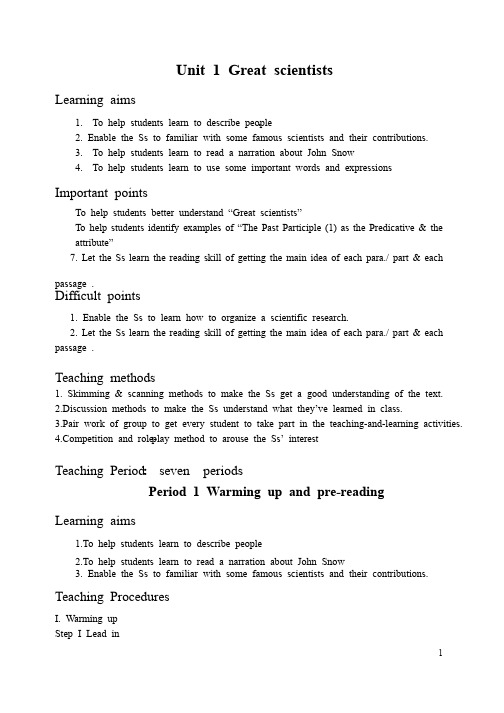
Unit 1 Great scientists Learning aims 1. To help students learn to describe people 。
2. Enable the Ss to familiar with some famous scientists and their contributions. 3. To help students learn to read a narration about John Snow 4. To help students learn to use some important words and expressions Important points To help students better understand “Great scientists”To To help help help students students students identify identify identify examples examples examples of of of “The “The “The Past Past Past Participle Participle Participle (1) (1) (1) as as as the the the Predicative Predicative Predicative & & & the the attribute”7. 7. Let Let Let the the the Ss Ss Ss learn learn learn the the the reading reading reading skill skill skill of of of getting getting getting the the the main main main idea idea idea of of of each each each para./ para./ para./ part part part & & & each each passage . Difficult points 1. Enable the Ss to learn how to organize a scientific research. 2. 2. Let Let Let the the the Ss Ss Ss learn learn learn the the the reading reading reading skill skill skill of of of getting getting getting the the the main main main idea idea idea of of of each each each para./ para./ para./ part part part & & & each each passage . Teaching methods 1. Skimming & scanning methods to make the Ss get a good understanding of the text. 2.2.Discussion methods to make the Ss understand what they’ve learned in class.Discussion methods to make the Ss understand what they’ve learned in class.3.Pair work of group to get every student to take part in the teaching-and-learning activities. petition and role-play method to arouse the Ss’ interestTeaching Period : seven periods Period 1 Warming up and pre-reading Learning aims 1.To help students learn to describe people 2.To help students learn to read a narration about John Snow 3. Enable the Ss to familiar with some famous scientists and their contributions. Teaching Procedures I. Warming up Step I Lead in Talk about scientist. T: Hi, morning, class. Nice to see you on this special day, the day when when you become a you become a senior two grader. I am happy to be with you helping you with your English. Today we are to read about a certain scientist. But first let’s define the word “scientist”. What is a scientist?A A scientist scientist scientist is is is a a a person person person who who who works works works in in in science, science, science, trying trying trying to to to understand understand understand how how how the the the universe universe universe or or other things work. Scientists Scientists can can can work work work in in in different different different areas areas areas of of of science. science. science. Here Here Here are are are some some some examples: examples: examples: Those Those Those that that study physics are physicists. Those that study chemistry are chemists. Those that study biology are biologists. Step II Ask the students to try the quiz and find out who knows the most. T: T: There There There are are are some some some great great great scientific scientific scientific achievements achievements achievements that that that have have have changed changed changed the the the world. world. world. Can Can Can you you name name some some some of of of them? them? them? What What What kind kind kind of of of role role role do do do they they they play play play in in in the the the field field field of of of science? science? science? Do Do Do these these achievements achievements have have have anything anything anything in in in common? common? Match Match the the the inventions inventions inventions with with with their their their inventors inventors inventors below below before you answer all these questions. 1. Archimedes, Ancient Greek (287-212 BC), a mathematician. 2. Charles Darwin, Britain (1808-1882). The name of the book is Origin of Species. 3. Thomas Newcomen, British (1663-1729), an inventor of steam engine. 4. Gregor Mendel, Czech, a botanist and geneticist. 5. Marie Curie, Polish and French, a chemist and physicist. 6. Thomas Edison, American, an inventor. 7. Leonardo da Vinci, Italian, an artist. 8. Sir Humphry Davy, British, an inventor and chemist. 9. Zhang Heng, ancient China, an inventor. 10. Stepper Hawking, British, a physicist. II. Pre-reading Step I Get Get the the the students students students to to to discuss discuss discuss the the the questions questions questions on on on page page page 1 1 1 with with with their their their partners. partners. partners. Then Then Then ask ask ask the the students to report their work. Encourage the students to express their different opinions. 1. What do you know about infectious diseases? Infectious diseases can be spread to other people. They have an unknown cause and need public health care to solve them. People may be exposed to infectious disease, so may animals, such as bird flu ,AIDS, SARS are infectious diseases. Infectious diseases are difficult to cure. 2. What do you know about cholera? Cholera is the illness caused by a bacterium called Vibrio cholerae. It infects people’s intestines(肠), causing diarrhea and leg cramps (抽筋).The most common cause of cholera is by someone eating food or drinking water that has been contaminated(污染) with the bacteria. Cholera can be mild(不严重的) or even without immediate symptoms(症状), but a severe case can lead to death without immediately treatment. 3. Do you know how to prove a new idea in scientific research? Anybody might come out with a new idea. But how do we prove it in scientific research? There are seven stages in examining a new idea in scientific research. And they can be put in the following order. What order would you put the seven in? Just guess. Find a problem→ Make up a question→ Think of a method→ Collect results→Analyse the results→ Draw a conclusion→ Repeat if necessary III. Homework 1.Finish the EX1,2and 3on Page 3. 2.Read the article on Page 2 loudly. IV.Teaching reflection Period 2 ReadingLearning aims 1.To help students learn to read a narration about John Snow To help students better understand “Great scientists”2.2.To help students better understand “Great scientists”Teaching Procedures Step I Pre-reading 1.Do you know John Snow? London and he defeated “King John Snow is a well-known doctor in the 19th century in Cholera”.2.Do you know what kind of disease is cholera? It is a kind of terrible disease caused by drinking dirty water and it caused a lot of deaths in the old times and it was very difficult to defeat. Let’s get to know how Dr. John Snow defeated “King Cholera” in 1854 in London in this reading passage: Step II Skimming Read the passage and answer the questions.1.Who defeats “King Cholera“? (John Snow) 2.What happened in 1854? (Cholera outbreak hit London.) 3.How many people died in 10 days? (500) 4.Why is there no death at No. 20 and 21 Broad Street as well as at No. 8 and 9 Cambridge Street? (These families had not drunk the water from the Broad Street pump.) (Optional) Skim the passage and find the information to complete the form below. Who When What How Result John Snow 1854 helping ordinary people exposed to cholera Examining Examining the the the source source source of of all water supplies and finding new methods of dealing with polluted waster “King Cholera” defeated Step III Scanning Read the passage and number these events in the order that they happened. 2 John Snow began to test two theories. 1 An outbreak of cholera hit London in 1854. 4 John Snow marked the deaths on a map. 7 He announced that the water carried the disease. 3 John Snow investigated two streets where the outbreak was very severe. 8 King Cholera was defeated. 5 He found that most of the deaths were near a water pump. 6 He had the handle removed from the water pump. Step IV Main idea and correct stage Read the passage and put the correct stages into the reading about research into a disease. John Snow Defeats “King Cholera”Paragraph Stages General ideas 1 Find a problem: What cause the cholera? The causes of cholera 2 Make up a question: Which is right? The correct or possible theory 3 Think of a method: Test two theory Collect data on where people were ill and died and where they got their water 4 Collect results: Mark the death Plot Plot information information information on on on a a a map map map to to to find find find out out out where where people died or did not die 5 Analyze the results: Find the resource of the water Look into the water to see if that is the cause of the illness 6 Find supporting evidence Find other evidences to confirm his conclusion 7 Draw a conclusion The polluted dirty source of drinking water was to blame for the cause of the London cholera Step V Group discussion Answer the questions (Finish exercise 2 on Page 3) 1. John Snow believed Idea 2 was right. How did he finally prove it? (John Snow finally proved his idea because he found an outbreak that was clearly related to cholera, collected information and was able to tie cases outside the area to the polluted water.) 2. Do you think John Snow would have solved this problem without the map? (No. (No. The The The map map map helped helped helped John John John Snow Snow Snow organize organize organize his his his ideas. ideas. ideas. He He He was was was able able able to to to identify identify identify those those households households that had that had had had many many many deaths deaths deaths and and check check their water-drinking their water-drinking habits. habits. He He identified those houses that had had no deaths and surveyed their drinking habits. The evidence clearly pointed to the polluted water being the cause.) 3. Cholera is a 19th century disease. What disease do you think is similar to cholera today? (Two (Two diseases, diseases, diseases, which which which are are are similar similar similar today, today, today, are are are SARS SARS SARS and and and AIDS AIDS AIDS because because because they they they are are are both both serious, have an unknown cause and need public health care to solve them.) Step VI Homework 1.Remmber the words and expressions of the article. ing the stages for scientific research and write a summary. 3.Finish P4, Ex 1,2(on SB) Ex3 make sentences on exercisebook (make one ’s way to, make up one one’’s mind, make sure, make room for) 4.Find out the phrases according to the Chinese (part 1 on the paper for language points) 5.Retell the story John Snow Defeats “King Cholera” by following the 7 steps on p1 6. Read notes to Unit 1, p78-79, find out some difficult points while reading the text IV .Teaching reflection Period 3 Language focusLearning aims 1.1.To help students better understand “Great scientists”To help students better understand “Great scientists”2.To help students learn to use some important words and expressions Teaching Procedures Step I Homework checking. Step II. Expressions & phrases 1.know about… 了解……的情况的情况2.lift up 举起;抬起;提升提升3.steam engine 蒸汽机蒸汽机4.physical characteristic 人体的特征人体的特征5.put forward a theory about black holes 提出一个有关黑洞的理论提出一个有关黑洞的理论6. infectious disease 传染性的疾病传染性的疾病7. in scientific research 在科学研究上在科学研究上8. examine a new scientific idea 验证一个新的科学思想验证一个新的科学思想9. draw a conclusion 得出结论得出结论 10. analyze the results 分析结果分析结果 11. a well-known doctor 一个著名的医一个著名的医生12. ordinary people 百姓;普通人普通人13. expose (…)to sth. 暴露(…..)在……中14. the most deadly disease 最致命的疾病最致命的疾病 15. terrified people 被吓坏的人们被吓坏的人们 16. get interested in sth./doing sth.产生兴趣对…产生兴趣17. absorb sth. into… 把….吸收入….18. gather the information 收集信息收集信息19. determine to do sth. 决心干某事决心干某事 20. a valuable clue 一条珍贵的线索一条珍贵的线索 21. the water pump 水泵水泵22. in addition (to…) 除..…之外还有… 23. link … to … 将…和…联系起来联系起来(be linked to…)24. have it delivered (have sth. done) 叫某人送东西叫某人送东西25. die of… 死于…26. announce with certainty 肯定地宣布肯定地宣布 27. polluted water 被污染的水被污染的水 28. prevent sb. from doing sth.阻止某人干某事阻止某人干某事29. deal with… 处理……30. solve the problem 解决难题解决难题 Expressions & Phrases (2) e to an end 到了尽头到了尽头2.find the cause of this illness 找出疾病的起因找出疾病的起因3.look into… 调查……4.apart from…除…之外;此外此外 (=except for…)5.prepare for… 预备好….6.be strict with sb. 对某人严格要求对某人严格要求7.a revolutionary theory 一个革命性的理论一个革命性的理论8.lead to… 通向…. ;导致导致… (注意注意:to 为介词) 9.make sense 有意义有意义10. at times =sometimes 有时候有时候11. contribute to sth. 有助于;促进促进12. encourage sb. to do sth. 鼓励某人做某事鼓励某人做某事 13. point of view 观点观点14. living conditions 居住条件居住条件15. break… in/into pieces 把…摔成碎块摔成碎块16. be devoted to sth./sb.专致于.; 关心;挚爱…17. devote one’s life to doing sth. 献身于….. 18. curved line 曲线曲线19. achieve great success 取得巨大的成功取得巨大的成功Step IV . Language Points 1.discover & invent discover v. “ 发现” 被探索或被揭示的事物早已客观存在着. Eg. 1)Columbus discovered America in 1492.哥伦布于1492年发现了美洲. 2)Who discovered radium? 谁发现了镭? invent v. “发明”,指的是发明原先不存在的东西. Eg.Who invented the steam engine? 谁发明了蒸汽机? 2.who invented the way of giving electricity to everybody in large cities?是谁发明了把电带给大城市中的每个人的办法? the way of doing sth.= the way to do sth … “做…..的方法”She showed us the way of cleaning it.= She showed us the way to clean it.她教给我们清洗它的办法. the way 引导的定语从句的引导词有三种, 可以用that;可以用in which;还可以省略还可以省略. Eg.Eg.I don’t like the way (that I don’t like the way (that / in which) you speak to your father. 我不喜欢你跟你父亲讲话的方式. 与way 相关的短语: by the way 顺便说顺便说顺便说 by way of … 通过……的方法,经,由的方法,经,由lose one’s w ay way 迷路迷路 no way (俚语) 没门,别想别想feel one’s way 摸黑走摸黑走,谨慎从事谨慎从事 on one’s way to…在去…的路上的路上in this way=by this means=with this method 用这种方法用这种方法3.Who put forward a theory about black holes?谁提出了黑洞的理论? put forward (1) to offer (an idea, suggestion etc.) for consideration 提出(建议等) (2)推荐某人或自己任职位;提名提名Eg.May I put your name forward as our monitor? 我能否提名你当我们的班长? put away 抛弃;舍弃舍弃 put down 写下来;记入名单; put on 穿上;戴上;增加增加 put off 耽误;延期延期put out 熄灭(灯);扑灭扑灭 (火) put up 建立;建造建造 put up with… 忍受…… •ou Y ou can can can take take anything anything from from from the the the shelf shelf shelf and and and read, read, read, but but but please please please ______ ______ ______ the the the books books books when when when you’ve you’ve finished with them. A. put on B. put down C. put back D. put off 4.This was the most deadly disease of its day. die (v.) dead (adj.) death (n.) deadly (adj.) adj. (1).dangerous; likely to cause death 危险的;致命的致命的 a deadly disease/weapon (2). highly effective against sth. or sb 不强有力的;致命的致命的 a deadly remark 击中要害的评论的评论(3)aiming to kill or destroy 意在杀死的;不共戴天的: a deadly enemy 不共戴天的敌人的敌人adv. (1). V ery 极度;非常;十分: deadly serious 十分认真十分认真(2). like death 死一般地死一般地: deadly pale 死一般苍白死一般苍白5.But he became inspired when he thought about helping ordinary people exposed to cholera. expose 在句中是过去分词作后置定语,表示被动.意为“患霍乱的”.如:The book written by Luxun is very popular. expose v. (1)to make visible 暴露暴露暴露 “expose ….to….” eg.He exposes his skin to the sun. 他把皮肤暴露在阳光下. (2)t (2)to reveal the guilt or wrong doing of …o reveal the guilt or wrong doing of …揭露;揭发揭发 eg.He exposed their plot.他揭穿了他们的阴谋. I threatened to expose him ( to the police).我威胁要(向警察)揭发他. expose to 使易受,使受使受 expose a fraud 揭穿骗局揭穿骗局expose sth. to the light of day 把某事暴露于光天化日之下把某事暴露于光天化日之下6. So many thousands of terrified people died every time there was an outbreak.每次爆发霍乱时就有大批惊慌的老百姓病死. every time 是连词,引导时间状语从句,意为“每次,每当”,如: Every time I meet him, I always think of the things happened between us. 每次见到他,我就想起发生在我们之间的事情. immediately, the the moment, moment, moment, directly, directly, instantly 等都可以作连词,引导时间状语从句,意为“一……就……”,eg. 1)I will give the letter to him immediately I see him.我一见到他就把这封信给他. 2)I came directly I got your letter.我一接到你的信就来了. 7.The first suggested that cholera multiplied in the air without reason.第一种看法是霍乱病毒在空气中无缘无故地繁殖着.(Suggest 用法参考P43.4,并完成相关的练习) 8.absorb v. 吸收(液体);承受;承担承担 (费用等) Eg.1)Use the cloth to absorb the spilled ink. 吸干撒的墨水吸干撒的墨水2)We will not absorb these charges.我们不能承担这些费用. absorb…in/by..吸引.注意注意eg.eg.I was absorbed in a book and didn’t hear you call.I was absorbed in a book and didn’t hear you call.专心看书专心看书absorb…into…吸收…eg.The big company has gradually absorbed these small companies into its own organization. 这家大公司逐渐将这些小的公司吞并了。
高中英语必修五_unit1_教案新部编本
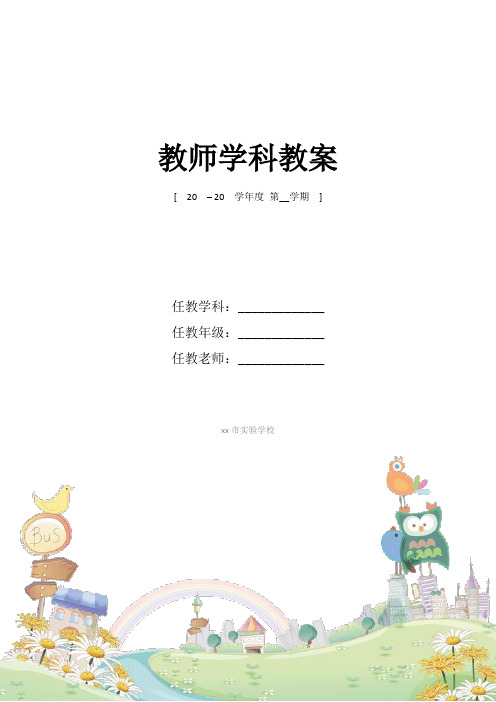
教师学科教案[ 20 – 20 学年度第__学期]任教学科:_____________任教年级:_____________任教老师:_____________xx市实验学校Unit 1 Great scientistsCopernicus’ revolutionary theoryTeaching aims:1 Improve the Ss reading and writing skill.2 Get to know Copernicus’ revolutionary theory.3 Learn some useful words and expressions.Main points:Reading and writingDifficult points:ComprehensionTeaching procedures:Step1. Lead-inAsk the students to name some great scientists, lead out Nicolaus Copernicus by present his picture on the PPT, and introduce him simply.Step2. Reading1 Give the students 10 minutes to read the passage and find the answer of the four questions by group work• a What did Copernicus think was the center of the solar system?• b Why Copernicus couldn’t he tell anyone about the theory?• c How many years did Copernicus work on the problem to complete his theory?• d When did Copernicus publish his theory?Then, check the answer before asking some students to answer2 Let Ss draw the two theories of the universe on P73 Let Ss judge the sentences which present the information of the text to check if they have got the passage generally.4 Language points: Let the student read the passage paragraph by paragraph to pick out the problems they have.The points may be:a.lead to: All roads lead to Rome.b.冒号+that从句(可略):尽管他很聪明,但他不勤奋,他从失败中得出结论:不劳无获Though he was very clever, he didn’t work hard and all his failure led to the conclusion: that no pain no gain.c.Only if you put the sun there did the movements of the other planets in the skymake sense.只有当你把太阳放在中心位置上,天空中其他行星的运动才能说的清楚Only 引导的状语放在句首,句子需用半倒装For example:只有用这种方法,你才能轻松得解决这个问题Only in this way, can you deal with the problem easily.就在你失去它的时候,你才会懂得时间宝贵。
人教-必修Book5-Unit1学案
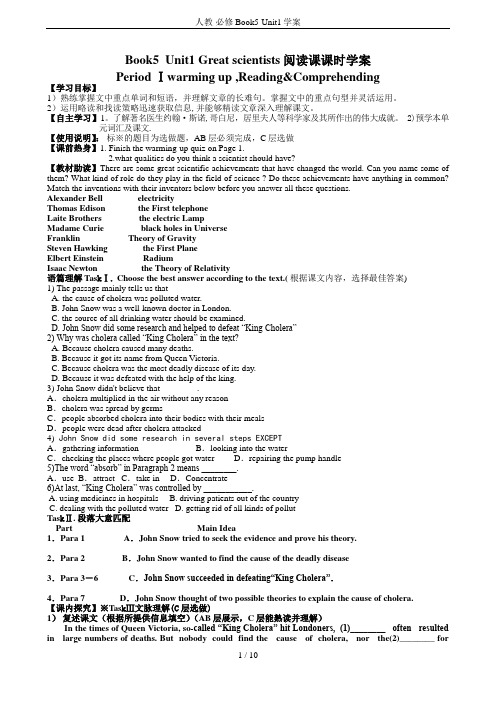
Book5 Unit1 Great scientists阅读课课时学案Period Ⅰwarming up ,Reading&Comprehending【学习目标】1)熟练掌握文中重点单词和短语,并理解文章的长难句。
掌握文中的重点句型并灵活运用。
2)运用略读和找读策略迅速获取信息,并能够精读文章深入理解课文。
【自主学习】1。
了解著名医生约翰·斯诺,哥白尼,居里夫人等科学家及其所作出的伟大成就。
2)预学本单元词汇及课文.【使用说明】:标※的题目为选做题,AB层必须完成,C层选做【课前热身】1. Finish the warming-up quiz on Page 1.2.what qualities do you think a scientist should have?【教材助读】There are some great scientific achievements that have changed the world. Can you name some of them? What kind of role do they play in the field of science ? Do these achievements have anything in common? Match the inventions with their inventors below before you answer all these questions.Alexander Bell electricityThomas Edison the First telephoneLaite Brothers the electric LampMadame Curie black holes in UniverseFranklin Theory of GravitySteven Hawking the First PlaneElbert Einstein RadiumIsaac Newton the Theory of Relativity语篇理解 Tas kⅠ. Choose the best answer according to the text.(根据课文内容,选择最佳答案)1) The passage mainly tells us that ______________A. the cause of cholera was polluted water.B. John Snow was a well-known doctor in London.C. the source of all drinking water should be examined.D. John Snow did some research and helped to defeat “King Cholera”2) Why was cholera called “King Cholera” in the text?A. Because cholera caused many deaths.B. Because it got its name from Queen Victoria.C. Because cholera was the most deadly disease of its day.D. Because it was defeated with the help of the king.3) John Snow didn't believe that ________.A.cholera multiplied in the air without any reasonB.cholera was spread by germsC.people absorbed cholera into their bodies with their mealsD.people were dead after cholera attacked4) John Snow did some research in several steps EXCEPTA.gathering information B.looking into the waterC.checking the places where people got water D.repairing the pump handle5)The word “absorb” in Paragraph 2 means ________.A.use B.attract C.take in D.Concentrate6)At last, “King Cholera” was controlled by ___________.A. using medicines in hospitalsB. driving patients out of the countryC. dealing with the polluted waterD. getting rid of all kinds of pollutTas kⅡ. 段落大意匹配Part Main Idea1.Para 1 A.John Snow tried to seek the evidence and prove his theory.2.Para 2 B.John Snow wanted to find the cause of the deadly disease3.Para 3-6 C.John Snow succeeded in defeating“King Cholera”.4.Para 7 D.John Snow thought of two possible theories to explain the cause of cholera.【课内探究】※Tas kⅢ文脉理解(C层选做)1)复述课文(根据所提供信息填空)(AB层展示,C层能熟读并理解)In the times of Queen Victoria, so-called “King Cholera” hit Londoners, (1)________ often resulted in large numbers of deaths. But nobody could find the cause of cholera, nor the(2)________ forit.John Snow, who was a well (3)________ (know)doctor then, took the (4)________ and wanted to (5)________ the problem.He gathered(6)__________ from the severe cholera outbreak and finally found it was the (7)________ (pollute) water that caused cholera.So the (8)________ of all the water supplies was examined (9)__________(immediate) .“King Cholera” was(10)________ in the end.2).概括课文大意The main idea of this passage is that John Snow ________out the ________ of the disease called cholera which was a disease in ________ in the 19th century.With Snow'sgreat efforts, the disease was finally under ________..( 问题展示) Discuss the following questions.What are the two theories explaining how cholera killed people?__________________________________________________________________________2) What evidence did John Snow gather to convince people that idea 2 was right?_______________________________________________________________________________3) Cholera was a 19th century disease. What disease do you think is similar to cholera today?___________________________________________________________________________练案【课堂效果检测】一. Find out the following phrases in the text(.英汉互译)1) scientific research ________________; 2) _________________________面对挑战3) infectious disease ____________________; 4) _________________________ 得出结论5) analyze the results ___________________; 6)_______________________ 暴露(…..)在…中7) terrified people _____________________; 8) ___________________________ 致命的疾病9) _____________________把….吸收入 10) be absorbed in__________________________11) ____________________决心干某事; 12) _________________________一条珍贵的线索13) __________________应该负责,应受责备14) _____________________将…和…联系起来15) _____________________精通; 16) __________________________ 提出17) _______________________肯定地宣布; 18) __________________________ 被污染的水19) ___________________阻止某人干某事; 20)cure sb of ___________________________二课文重点句式点击(在文中找到下列句子翻译并理解做题)1. With this extra evidence John Snow was able to announce with certainty that polluted water carried thevirus.with this extra evidence 有了这个额外的证据;with certainty肯定地,有把握地在句中作_______,相当于副词.that 引导_______从句,polluted_____分词作____语.2. So many thousands of terrified people died every time there was an outbreak.terrified 过去分词作定语every time 短语充当连词作用,除此之外,each time, any time, the first time, last time, next time,the moment, immediately, directly, instantly也可以和every time 一样,用作_____________ 词,引导______________状语从句。
- 1、下载文档前请自行甄别文档内容的完整性,平台不提供额外的编辑、内容补充、找答案等附加服务。
- 2、"仅部分预览"的文档,不可在线预览部分如存在完整性等问题,可反馈申请退款(可完整预览的文档不适用该条件!)。
- 3、如文档侵犯您的权益,请联系客服反馈,我们会尽快为您处理(人工客服工作时间:9:00-18:30)。
Book 5 Unit 1 Great Scientists自主预习学案教师寄语:An idle youth, a needy age. 少壮不努力,老大徒伤悲。
Ⅰ. Preview the new words, pay special attention to their pronunciation, word-spelling and their Chinese meanings.Ⅱ. Read the passage John Snow Defeats “King ” and answer the following questions.1.What does the passage mainly talk about?A.John snow was a famous doctor in London.B.The reason that caused the deadly disease cholera.C.John Snow solved the problem of cholera.D.Cholera was and is a serous deadly disease.2.What was the original source of disease of “King Cholera”?A. A cloud of dangerous gas.B.The spreading of virus among people.C.Water in a certain pump in London.D. A river polluted by the dirty water.3.Why did No.21 Borad Street in London have no deaths?A.The people just drank the water from the pump.B.They drank beer as well as water from the pump.C.They didn’t absorb the dangerous air.D.They suffered no germs at all.4.Which of the two theories that John Snow was interested in was true finally?A.Both.B. The first oneC. The second one.D. Neither.5.What do you think the Londoners would do with the unused pumps after defeating“King Cholera”?A.They would destroy them.B.They would reuse them after cleaning.C.They would desert them for good.D.They would go on to use them without cleaning.Book 5 Unit 1 Great Scientists讲授学案制作人:刘远花李晓田审核人:刘庆民制作时间:2009-8-31教师寄语: You must believe in yourself. That is the first step to success.词汇学习:Ⅰ. 重点单词1.defeate.g. (1)John beat Tom at table tennis yesterday.(2)The English team was defeated by three goals to one.(3)The government has suffered a serious defeat.(4)I wonder who has won the game.精讲点拨归纳用法:___________________________.1) They say he was ______ by lightning during a terrible thunderstorm.A. defeatedB. caughtC. damagedD. struck2) In the first two years of the war in former Yugoslavia, 28 reporters and photographers were killed. Hundreds more were ______.A. injuredB. buriedC. defeatedD. saved3) It is said that Jim ____ Tom by about a meter and ___ the race at last.2. attende.g. (1) Will you be attending the meeting tomorrow?(2) The queen had a good doctor attending (on) her.(3) Were you attending to what I was saying?精讲点拨归纳用法:_________________________.1) I wrote him a letter to show my ______ of his thoughtfulness.A. achievementB. agreementC. attentionD. appreciation2) The company is starting a new advertising campaign to _____ new customers to its stores.A. joinB. attractC. stickD. transfer3) Tim ____ to a neighborhood watch group in Stoneville, Indiana, USA.A. attendsB. belongsC. goesD. turns3. exposee.g. (1)He smiled suddenly, exposing a set of amazingly white teeth.(2)He didn’t want to expose his fear to anyone.(3)She was exposed as a liar.(4)Don’t expose babies to strong sunshine.精讲点拨归纳用法:_____________________.1) ______ to the strong sunbeam too long, his face got sunburnt.A. ExposingB. Having exposedC. ExposedD. To expose2) ______ to the strong sunbeam made his face sunburnt.A. ExposingB. Having exposedC. ExposedD. Having been exposed4. curee.g. (1)When I left hospital, I was completely cured.(2)This medicine will cure you of your cough.(3)There is no cure for this kind of illness.精讲点拨归纳用法:___________________.1) More patients _____ in hospital this year than last year.A. treatedB. have treatedC. had been treatedD. have been treated2)My grandma has been cured _____ her heart disease.A. offB. ofC. aboutD. away5. blamee.g. (1)Don’t blame me if it doesn’t work—it’s not my fault.(2)They blamed the Russians for the failure of the talks.(3)I t’s Mr. Lee who is to blame.(4)The judge laid the blame for the accident on the driver of the car.精讲点拨归纳用法:___________________.blame sb. for sth; scold sb. for sth; charge sb. with sth1)_____ for the breakdown of the school computer network, Alice was in low spirits.A. BlamingB. BlamedC. To blameD. To be blamed2)Mr. Green stood up in defense of the 16-year-old boy, saying that he was not the one _____.A. blamedB. blamingC. to blameD. to be blamed6. contributee.g. (1)I contributed a pound to John’s leaving present.(2)He regularly contuibuted to the college magazine.(3)Carelessness caused/ led to/ resulted in/ brought about the serious trafficaccident.精讲点拨归纳用法:___________________.Do you know the cause ____ his failure in the driving test?A. led toB. brought forthC. contributing toD. attributing to7.announcee.g. (1)They haven’t formally announced their engagement yet.(2)Would you announce the guest when they arrive?(3)He declared that he fell in love with her.(4)He declared nothing to pay the tax for, but I knew he was lying.精讲点拨归纳用法:___________________.用announce 或declare 的正确形式填空。
